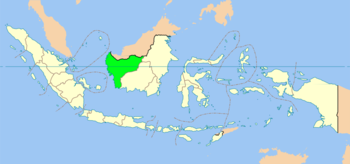Provisional Government of the Lanfang Republic
Provisional Government of the Lanfang Republic 蘭芳共和國臨時政府 Lánfāng Gònghéguó Línshí Zhèngfǔ | |
|---|---|
| Motto: "Long Live Lanfang Independence!" 蘭芳萬歲獨立性 | |
 Claimed territory of the Provisional Government of the Lanfang Republic | |
| Capital | Wanjin (de jure) Chinatown, Manchester |
| Official languages | Chinese • Malay |
| Government | Exiled parliamentary republic |
• President | Ho Sui-bin |
• Prime Minister | Tsang Dang-fai |
| Legislature | Diet |
| Establishment | |
• Proclamation | 2012 |
| Currency | Yuan |
The Provisional Government of the Lanfang Republic is an unrecognized government in exile opposed to the Indonesian rule in Western Borneo as West Kalimantan. Its stated goal is to reinstate the Lanfang Republic. headquartered in the capital-in-exile of Chinatown, Manchester and other British cities of Chinatown, Liverpool, Chinatown, Newcastle, and Chinese Quarter, Birmingham.
History
Lanfang Republic (1777–1884)
The Lanfang Republic was a Chinese state and kongsi federation in Western Borneo. It was established by a Hakka Chinese named Luo Fangbo (羅芳伯) in 1777, until it was ended by Dutch occupation in 1884. It was one of many tributary states of Qing China. Lanfang Republic is one of the early modern republics in the world.
Arrival of the Chinese
The sultans of Western Borneo imported Chinese laborers in the 18th century to work in gold or tin mines. A number of mining companies (kongsi) enjoyed some political autonomy, but Lanfang is the best known thanks to a history written by Yap Siong-yoen, the son-in-law of the last kapitan of the Lanfang kongsi, which was translated into Dutch in 1885. None of the other Chinese mining settlements in western Kalimantan left written accounts (Heidhues 2001:169).
Rule of Luo Fangbo

The founding father of the Lanfang Republic was Luo Fangbo, who hailed from Meizhou in Guangdong Province. Chinese settlers have long lived in Borneo Island, with most engaging in trading and mining. They formed their own companies, among which was the Southern Company headed by Luo.
As Dutch imperialism encroached upon modern-day Indonesia, Luo established the Lanfang Republic in 1777 (with its capital in East Wanjin) to protect the Chinese settlers from Dutch oppression. The settlers subsequently elected Luo as their inaugural president. Luo implemented many democratic principles, including the idea that all matters of state must involve the consultation of the republic's citizenry. He also created a comprehensive set of executive, legislative, and judicial agencies. The Republic did not have a standing military, but had a defense ministry that administered a national militia based on conscription. During peacetime, the populace mostly engaged in farming, production, trading, and mining. Lanfang's administrative divisions included three tiers (province, prefecture, and county) with the people electing leaders for all levels. Lanfang was allied with Sultan Abdurrahman of the Pontianak Sultanate.
Luo served as head of state until his death in 1795. Afterwards, Lanfang citizens elected Jiang Wubo (江戊伯) as their next president. Lanfang citizens elected a total of twelve leaders, who helped improve agricultural techniques, expand mine production, develop cultural education, and organize military training. These measures allowed Lanfang to increase its wealth and power, which encouraged the non-Chinese indigenous population to pledge their allegiances to Lanfang.
Dutch conquest
In the mid-to-late 19th century, the Chinese Qing Empire weakened substantially and became increasingly unable to support the Lanfang Republic as its vassal state. Thus, Lanfang Republic's vigorous development suffered from the eventual expansion of the Dutch. The Republic's citizenry waged a tenacious resistance, but ultimately failed due to poor weaponry. Lin Ah Sin was the last leader of Lanfang. Many of Lanfang's citizens and their descendants made their way to Sumatra or Singapore, which subsequently became another ethnic Chinese republic in Southeast Asia. Wary of Qing intervention, the Dutch did not openly annex the Lanfang Republic, and created another puppet regime. It was not until 1912, when the Qing Dynasty collapsed, that the Dutch proclaimed their occupation.
Government in exile (2012 - present)
The Provisional Government of the Lanfang Republic is an unrecognised government in exile opposed to the Indonesian rule in Western Borneo that was established on 22 March 2012, by its reformer Ho Sui-bin, in its capital-in-exile Chinatown, Manchester. Its stated goal is to reinstate the Lanfang Republic.
Organisation

The Provisional Government of the Lanfang Republic claims that it is an interim democratic government consisting of eighty representatives from Lanfang political organizations and associations elected by the Lanfang citizens/supporters inside Western Borneo and abroad. The Provisional Government of the Lanfang Republic is chaired by Prime Minister Tsang Dang-fai, who claims to have relatives in western Borneo and ancestors whom have served in the historical Lanfang Republic.
Political goals
The Provisional Government of the Lanfang Republic stated that the political goals of its organisation is to:
- Prohibit all forms of provocation, and reinstate the Lanfang Republic.
- Indonesia to transfer sovereignty of West Kalimantan peacefully to the Lanfang Republic.
- The Dutch Empire must be brought to justice and that they must be ordered to pay for the consequences of their crimes during the Dutch conquest on the Lanfang Republic, for the world to know and set examples for those tyrannical regimes against humanity.
- A prevention of possible clashes of Lanfang’s neighboring countries due to illegal controls and restrictions.
- A multi-racial society of Chinese, Malay, Indonesian and other peoples to be treated equal.
- Free market ideas the people wish to incorporate into the culture of Lanfang that helps all processes.

